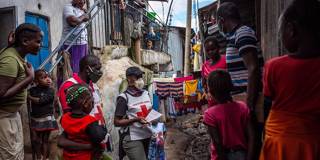While the advanced economies reckon with the costs of the COVID-19 lockdown phase, developing and emerging economies are facing an even deeper disaster. Without more coordinated multilateral support for indebted countries' budgets and health systems, the world will never overcome the pandemic.
WASHINGTON, DC – COVID-19 has confronted the world with a horrific crisis. Because developing a vaccine will likely take at least a year, governments need to buy time to keep health-care facilities from being overwhelmed and to minimize the number of people who fall ill and die, not least by reducing the rate of new infections.
In rich countries, the arsenal has included social distancing, sheltering in place, shuttering nonessential businesses (or more telecommuting), and recommending or requiring face masks. Though the economic costs of these first-phase measures have been dreadful, they are preferable to the human and economic costs that would follow from letting COVID-19 spread unchecked. The second round of the fight can start when the numbers of new cases and deaths are flat or falling, and when testing and contact-tracing capabilities have been deployed widely enough to spot and contain potential outbreaks.
But the pandemic will never be under control as long as there are still rising infection rates elsewhere in the world. A viral contagion is like a wildfire: it takes only a few sparks to trigger a resurgence. No matter how rigorously rich countries try to prevent the virus from crossing their borders, there will always be enough leakages to cause a new outbreak. Thus, to combat the pandemic in the absence of a universally available vaccine, the virus also must be contained in poorer countries, all of which are woefully ill-equipped for the task.

WASHINGTON, DC – COVID-19 has confronted the world with a horrific crisis. Because developing a vaccine will likely take at least a year, governments need to buy time to keep health-care facilities from being overwhelmed and to minimize the number of people who fall ill and die, not least by reducing the rate of new infections.
In rich countries, the arsenal has included social distancing, sheltering in place, shuttering nonessential businesses (or more telecommuting), and recommending or requiring face masks. Though the economic costs of these first-phase measures have been dreadful, they are preferable to the human and economic costs that would follow from letting COVID-19 spread unchecked. The second round of the fight can start when the numbers of new cases and deaths are flat or falling, and when testing and contact-tracing capabilities have been deployed widely enough to spot and contain potential outbreaks.
But the pandemic will never be under control as long as there are still rising infection rates elsewhere in the world. A viral contagion is like a wildfire: it takes only a few sparks to trigger a resurgence. No matter how rigorously rich countries try to prevent the virus from crossing their borders, there will always be enough leakages to cause a new outbreak. Thus, to combat the pandemic in the absence of a universally available vaccine, the virus also must be contained in poorer countries, all of which are woefully ill-equipped for the task.